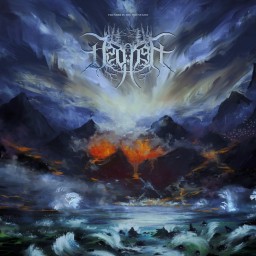Reviews list for Dzö-nga - Thunder in the Mountains (2020)
Beauty Through Redemption
Thunder in the Mountains was one of the first albums that made it onto my 2020 listening rotation when it released almost a year ago now, much to my surprise. I had randomly stumbled upon Dzö-nga a few years ago, hearing their 2017 album The Sachem's Tales and feeling extremely unimpressed. Their new offering is like night and day though, taking the faint ideas that I can barely remember from The Sachem's Tales and creating a compelling and gorgeous set of songs that exist in a unique middle ground between being folky but atmospheric. While there are atmospheric ideas and choices present throughout the album, like during the female-fronted verses and instrumental sections of "The Death of Minnehaha" and "The Song of Hiawatha", the album on the whole is still very riff, melody, and chorus focused. Even though all the elements of Thunder in the Mountains seem to point to the expectation of the listener getting lost in a folky, Native American themed landscape, that's not exactly what it accomplishes, and I think that's part of the charm.
With Atmospheric Black Metal and a lot of Folk Metal being dominated by a few select styles from a few select regions of the world, it's been a breath of fresh air to hear different styles of sound and instrument choice surfacing a bit more in 2020. With Kataayra's two 2020 albums showcasing a more temperate, muggy atmosphere with tribal influences, Dzö-nga follows suit with a less cold and despair-ridden sound in favor of a warm, inviting, but still heavy sound that utilizes a ton of plucky acoustic guitars, smooth strings, and high pitched flutes. The flutes and the occasional piano carry the brunt of the melodies during the instrumental sections, showcased instantly during the chorus of the opener "The Song of Hiawatha". Even though the guitar and drums are more often than not playing rather generic Black Metal background fare, there's still a plethora of great riffs and solos that come and go as the songs progress. The pinnacle riff towards the middle of "The Death Of Minnehaha" is a fantastic and memorable way to close out the album, showing that this album has more tricks up its sleeve than just pure atmosphere. I found the songwriting and overall flow of the longer tracks to be great as well, with "The Death Of Minnehaha" pulling a clever reprise of the original acoustic riff that was used on "The Song Of Hiawatha". The way each of these longer songs progress is incredibly satisfying to me, bouncing between airy female and harsh male vocals as well as Folk-carried atmospheric sections and hard-hitting Metal sections.
The middle of the album is much more forgettable than the two bookends, unfortunately. "Heart Of Coal" reuses the same elements in a slightly more condensed package and has an interesting instrumental ending but just feels less potent than the rest of the album. "Flames in the Sky" and "A Soul To Burn" are remarkably chorus-focused, being borderline catchy with noteworthy melodies from the vocals and the flutes or violins after the choruses. "Starlight, Moonlight, Firelight" mostly serves as an intro to "The Death Of Minnehaha" but I still really enjoyed seeing how pretty Dzö-nga can make their formula. Thunder in the Mountains just hits that sweet spot of catchy folk instrumentation with well written percussion and background riffs that occasionally hit extremely hard. The vocals hold it back though, with the harsh vocals sounding a bit tight and out of place, and the female vocals sounding a little one-note and possibly even too relaxed at times. Some of the more generic sections go on for a bit too long too, especially in the middle portion of the album, with "Heart Of Coal" and "Flames in the Sky" just existing for the most part.
Faults aside, Thunder in the Mountains is a unique take on a folky and slightly atmospheric Black Metal album that centers loosely around Native American culture. I think that warmer sounding Black Metal has its place in the genre moving forward and even though I'm sure that there have been other bands with this style before 2020 (Saor being one of them), it was neat to discover multiple groups this year pushing for this kind of sound. The opener and closer are very well written and deserve their extended length and even though the middle falls a bit flat it never stopped me from coming back to it. Plus, it's insane how much of an improvement this album is over their 2017 release that I'm really hoping that Dzö-nga can ride this creative wave and continue to hone and experiment with their sound in the coming years.
The newest album from Boston based symphonic black metal band, Dzö-nga, has all of the makings of one of this year's best heavy metal albums. There is so much to love here. The compositions of these songs are effortless, blending clean and harsh vocals, leads guitar, flutes and strings, not to mention the fantastic dynamic contrast between loud and soft sections. I really enjoyed how the band was able to build through the first half of “The Death of Minnehaha”, slowly adding new elements to a previous idea and making it grow in intensity.
“Heart of Coal” and “Flames in the Sky” both have some fantastic melodic hooks to come back to, making them instant standouts for me. The mixing is stellar, as it deals with the heavy guitar work that owes a lot to symphonic/power metal, while the melodic touches from the strings, flutes and other instruments are wonderful. The bass lines are fruitful and forward thinking, the percussion work is pretty crazy at times, and the tour de force of clean female vocals and harsh black metal screeching makes for a wonderful dichotomy and allows for the group to be able to make all of these crazy transitions without having any of them sound forced.
If I had to criticize this album for anything, the album does feel like it ends abruptly with “The Death of Minnehaha” fading out rather than a clean finish. Also, while the penultimate track “Starlight, Moonlight, Firelight” does sound very nice, its sole purpose feels like a musical reprieve; allowing the listener to catch their breath before the eleven minute closer. But these are just minor quibbles on what is an excellent album. If you are a fan of the symphonic or folk sides of atmospheric black metal, then this will be essential listening in 2020. Don’t leave these mountains untraversed.


 Xephyr
Xephyr
 Saxy S
Saxy S